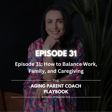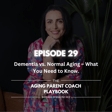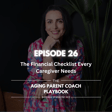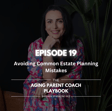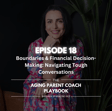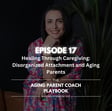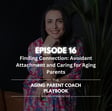Become a Creator today!Start creating today - Share your story with the world!
Start for free
00:00:00
00:00:01

Episode 13: Supporting Aging Parents During the Holidays: Signs & Strategies
This article explores how to support aging parents during the holiday season by recognizing signs of emotional or physical struggles. It provides practical strategies to ensure their well-being and foster meaningful connections. Learn how to create a joyful and stress-free holiday experience for the entire family.
Transcript
Caring for Aging Parents During Holidays
00:00:42
Speaker
Hello and welcome back to another episode of the Aging Parent Playbook, where we provide insights and guidance for families supporting their aging loved ones. As the holiday season approaches a time filled with joy, gatherings, and cherished traditions, we must also be attentive to the wellbeing of our aging parents. This period can sometimes reveal subtle signs of decline. We'll talk about how to recognize these signs and had how to recognize and share that these are not signs of your parent being difficult or um forgetful or just ornery, right? And how to navigate these challenges with empathy during the holidays.
Recognizing Cognitive Decline
00:01:32
Speaker
So during the holidays, right, this is a unique time where um this is a time where we offer a unique opportunity when families are getting together, right? We're seeing um loved ones. Maybe we haven't seen them in a while. And even if we have seen them, we are seeing them in different circumstances and interacting with different folks and maybe even in different um places, right? Because it's not the same thing to see your parent every week in their home as seeing your parent in um a banquet hall or somebody else's home or navigating that, right? So it's a little different, right? So I want to discuss what, you know, some, some subtle differences between cognitive decline and normal aging, right? So if there's changes in communication,
00:02:25
Speaker
That is, you know, is it, and this is when it's important that, you know, to to be mindful of the change.
00:02:38
Speaker
So one of the first things that um I tell folks to look for are changes in communication, right? And this is when a different environment can be very helpful, right? Because it's not the same thing to have a one-on-one conversation with your parent as to seeing them having a conversation with multiple folks, right? And trying to navigate the those challenges, right? Or trying to navigate seeing people they haven't seen in a long time and remembering their names, right? those are um So those that's that's something to be on the lookout for, right? And so all and finding the right words, right? Because usually when you're having the same old, same conversations with your parents,
00:03:23
Speaker
It's not like they have to really get out of their comfort zone too much. But with new people, they may be talking things about things that are a bit different, a bit ah bit off script. right um And so that's something to look forward to, look look out for. it And then difficulty with familiar tasks. right If your parent is always the one who made, I don't know, a traditional bread pudding right for Christmas or or whatnot or Christmas morning.
00:03:53
Speaker
and they struggle to remember the recipe or um they, you know, or they get together with folks and they start, they forget how they to play a card game, right? Something that maybe they've played for forever and now they struggle with counting. That is something to be mindful of, right? Also
Emotional and Relationship Impact
00:04:19
Speaker
confusion about time and place, right?
00:04:26
Speaker
forgetting why, you know, where what a year it is, right? Or what the purpose of the gathering was, right? Or, um you know, they can they can maybe say that they're at a gathering because it was a wedding, right? They make a confused and and maybe it was just Christmas Eve, right? Or a birthday party, right? um So, and that's not that's not normal aging, right? Because normal aging would be,
00:04:56
Speaker
when asked what year it was, them saying 19, 1924, right? And then you're like, what? And then they'll correct, no, I mean, 2024, right? Just because of so many years of getting used to saying 19, right? um And the self correction is the the important part. It's not the error, right?
00:05:15
Speaker
But being aware of that as well, right? Looking how they're behaving, right? If there are mood swings that are uncharacteristic,
00:05:26
Speaker
right If they're very reactive or very withdrawn, things that are not at their baseline. right And so again, these things may not necessarily be just linked with cognitive decline that can also show up with folks are depressed or severely anxious. you know So it's just always good to talk to your parent about it and talk to their physician about it. right And if they have less engagement in the activities they used to enjoy.
00:05:54
Speaker
right Um, if they've lost interest, right. Um, or they're not willing necessarily to to participate in some of the holiday festivities. Um, again, if that was not their baseline, right. Um, if someone who never liked Christmas, um, still doesn't like Christmas, that's not a, that's not a change. Right. So I think one of the most challenging things that sometimes can happen, um, is not only navigating it for ourselves, right, with our parents, but also navigating it with our spouses and navigating it with our children, um that these behaviors are not intentional, right? These behaviors are not um trying to be, our parents trying to be difficult or or anything of of the sort, right? This is most challenging if our,
00:06:54
Speaker
our spouses have challenging relationships with our with our parents, right? Because even though our parent may be showing signs of cognitive decline, our spouse is still bringing any old, um any of their history into that new cognitive decline, right? And so they may have less patience or less tolerance, right?
00:07:18
Speaker
And so it can be really, it it it can put but it could put a strain on a relationship, right? Because not only do you have like your relationship with your parent, right? And your relationship with your own internal relationship with your parent, right? Because there's um there's a couple of things and not to be too much of a psychiatrist, right? But there's the relationship that is very in the world, the real world with your parent, right?
00:07:43
Speaker
And then there's a relationship you have with your parent in your inner world, right? The way you would like to speak to your parent, the way you'd like to show up with your parent, right? um And those can be either very similar or very divergent, right? um But now you also have to add to the mix any challenges that your spouse may have with your parent, right? Especially if your parent is experiencing cognitive decline that has a lot of irritability, that has a lot of agitation, that has a lot of um behaviors that would be considered to be bothersome or negative, right?
Challenges of Holiday Festivities
00:08:22
Speaker
um And one of the things that I educate um my clients on, and I ask them to bring in their spouses, um usually with
00:08:33
Speaker
at least one of the sessions, if not all of them, spouses come in um or siblings come in. And we talk about it because, you know, hopefully it's not just one person um caring for their aging parents. Hopefully this person also has a community, small or large, right? But someone else, the support to talk about it, right? To talk about that um there are things that impact our aging parent um during the holidays, right? So festivities, right?
00:09:03
Speaker
great, joyous occasion, getting together with family, this can be very overwhelming. And this can be a lot of sensory overload, especially if they have hearing or vision problems, right? Especially if they're, they ought to wear a hearing aid, but they choose not to, or they do wear the hearing aid, and they have all that feedback that's horrible, right? Or, you know, there's a lot of things that can be going on, right? And especially imagine if you're in a situation that you're confused, and you don't understand what's going on, it would be overwhelming, right?
00:09:32
Speaker
And their routine is disrupted. One of the things that keeps folks at home longest um is having a very organized routine, right? Because then the routine is the memory. Even if folks don't are having experiencing cognitive decline, there's like this muscle memory, this bodily memory that allows them to just do things rotely, right? That it's usually at later stages that that diminishes. But if you change the routine, then we can have a significant decline, right?
00:10:01
Speaker
And this happens when um sometimes when children want to help their parent and invite them to live with them. And then all of a sudden they see a significant decline and really it was them living in their home and having that routine that was really like tethering them together, right? And also that the just that the sheer amount of social interactions right having um can be taxing. Can be taxing to many folks without cognitive decline, right? Depending on whether they're extroverts or introverts.
00:10:31
Speaker
um But still, it can be it can be very stressful, especially if they don't remember and they're aware of it, right? Because that's the other part. And usually, early on, folks are can be aware of it, right? And so, you know, it's really, it's because when we when we talk about how cognitive decline impacts the caregiver, the caregiver is not in a silo, right? The caregiver, it impacts their relationships as well, right? And also it can sometimes be um a diversion of energy from, you know, um and I've said wife and, you know, so spouse and husband, and you know, but whoever the caregiver is, right? The spouse may be like, well, now you have to spend all this time with your mom, you know, where's my time? And she's just doing it
Balancing Commitments
00:11:21
Speaker
on purpose. You know how she is. She's just trying to get your attention, right? And this can add to a lot of,
00:11:28
Speaker
feelings of resentment, right, on both sides, right, it can add to feelings of, you know, because then the caregiver may be, well, what if my mom is taking advantage of me or what if it is she is acting out? And then like, am I like, you know, is this am I wasting my time? And then feeling bad for thinking that if you know, so there's a lot of things that is really important to start addressing and start talking about how to navigate these situations. Because not only is it are things gonna progress, right? But what about your spouse's parents? How are you gonna show up for your spouse's parents? How is that dynamic gonna change, right? And these things are impacted by where they are geographically, if you're in the same in town, the same city, same state, same country, right? Because I've helped folks whose parents and in-laws are in different countries, right? Which can feel overwhelming, right? How to navigate that, how to establish a plan, how to have um a, um
00:12:26
Speaker
Communication tree right to know who is next in line and in terms of important information that has to be communicated to caregivers. So But what I will tell you that all of this is doable and we can figure it out and we can establish a pan right As in everything, the most important thing is to educate yourself. So I'm glad you're listening to this podcast right now and learning about what are things that can um get in the way of you showing up as your best self for your aging parent and for your spouse, but most importantly for yourself, right? Educate your your your family. Educate your friends. Let them know, hey, my mom's coming over. She may be confused. She may understand.
00:13:16
Speaker
i think her I think her memory is failing a little bit. just I just want you to be aware. right um Try to maintain a calm environment. Try not to be very abrupt in changes, right especially during conversations.
00:13:30
Speaker
folks with with like Folks with aging brains, irrespective of whether there's a cognitive decline, are not good at frame shifting. What does that mean? They are not good at shifting from one topic to another, but this is most evidence in folks who have cognitive decline, that you have to give them some space and time. You may have to repeat yourself a couple of times because they can't switch conversations like that, right? Especially if someone comes in and interrupts. So to have to be mindful of that, right? um Maybe simplify traditions, maybe make things a little bit simpler. Instead of going to your cousin's house and then going to another, your aunt's house, and then maybe going to midnight mass,
00:14:12
Speaker
Maybe skip that and maybe skip Midnight Mass, right? Or ski go only one place, right? Simplify the things. So we're setting everyone up for success, right? And remember to try to and and involve your loved one, right? To encourage their participation. Even if you go to um an event and they're isolated and they kind of want to be by themselves, maybe sit with them and hold their hand, right? And invite folks over.
00:14:42
Speaker
one at a time to speak with them because that is for them, but that's also for you and for your memory of how you showed up for them and how um you were in their presence, right? So, and when giving, you know, um reminders, remember to be gentle and caring and supportive, right? And to remember that this is not on purpose, that they are not being willful or spiteful, that there is just not the capacity there.
00:15:12
Speaker
right? Because and that may trigger some some anger in you, right? Because our parents have always been the ones who were most capable, right? And to see them failing may sometimes
Supporting Parents with Compassion
00:15:26
Speaker
inspires some anger in us. So to be aware of that, but to not direct it towards them. So I want to conclude that the holidays are a time for connection and celebration, you know, and creating a supportive environment. And I really want you to take this time to really enjoy your parents and to um enjoy your family and enjoy your network. And it is important to acknowledge and to discuss the impact that cognitive decline has on your family and to seek support to maintain healthy relationships. Seek out a support group, seek out the aging parent coach.
00:16:09
Speaker
i am more than willing to help you navigate this process. So thank you for joining me on this episode of the Aging Parent Playbook, wishing you and your family a compassionate and joyous holiday season. Till next time.


